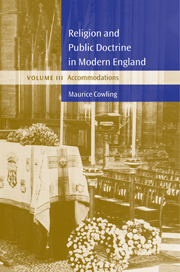Book contents
- Frontmatter
- Contents
- Foreword and acknowledgements
- Introduction
- I The Christian intellect and modern thought in modern England
- II The post-Christian consensus
- 15 Modern knowledge and the post-Christian consensus I
- 16 Modern knowledge and the post-Christian consensus II
- 17 Modern knowledge and the post-Christian consensus III
- 18 Modern knowledge and the post-Christian consensus IV
- 19 English Socialism as English religion
- 20 Literature and the post-Christian consensus
- 21 Modern knowledge and the post-Christian consensus V
- 22 Modern knowledge and the post-Christian consensus VI
- 23 Judaism and the post-Christian consensus
- III Conclusion: religion and public doctrine in modern England
- Notes
- Index of proper names
17 - Modern knowledge and the post-Christian consensus III
Published online by Cambridge University Press: 23 December 2009
- Frontmatter
- Contents
- Foreword and acknowledgements
- Introduction
- I The Christian intellect and modern thought in modern England
- II The post-Christian consensus
- 15 Modern knowledge and the post-Christian consensus I
- 16 Modern knowledge and the post-Christian consensus II
- 17 Modern knowledge and the post-Christian consensus III
- 18 Modern knowledge and the post-Christian consensus IV
- 19 English Socialism as English religion
- 20 Literature and the post-Christian consensus
- 21 Modern knowledge and the post-Christian consensus V
- 22 Modern knowledge and the post-Christian consensus VI
- 23 Judaism and the post-Christian consensus
- III Conclusion: religion and public doctrine in modern England
- Notes
- Index of proper names
Summary
The extent and … nature of the influence, which a modification of history must exercise on religious belief, is a subject on which it is remarkably easy to come to a conclusion, and extremely hard to come to a right one. Courage to express one's views has long ceased to be a virtue … and it is on the fair way to become a vice … Especially where religion is involved, there is one courage it is well to be free from, the courage to utter one's (mere) opinions.
(F. H. Bradley, The Presuppositions of Critical History, 1874, in Collected Essays, 1935, vol. I, p. 3)Everywhere from the crushed rocks beneath our feet to the soul of man, we see power, intelligence, life and glory, which astound us and seem to call for our worship. And everywhere we see them perishing, devouring one another and destroying themselves, often with dreadful pain, as though they came into being for no other end. Tragedy is the typical form of this mystery … it forces the mystery upon us, and makes us realise so vividly the worth of that which is wasted that we cannot possibly seek comfort in the reflection that all is vanity.
(A. C. Bradley, Shakespearean Tragedy, 1904, p. 23).A visible Church, like the Church of England, or of Rome … may be a part of the kingdom of God on earth. But a family, or a nation like the English nation, is a far more sacred thing than any Church, because these are what prescribe our duty and educate our will.
(Bernard Bosanquet, The Kingdom of God on Earth, n.d. in Essays and Addresses, 1889, p. 123)- Type
- Chapter
- Information
- Religion and Public Doctrine in Modern England , pp. 438 - 467Publisher: Cambridge University PressPrint publication year: 2001

